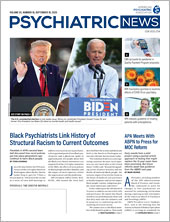All people experience trauma and loss, and today they are dealing with unprecedented stress related to COVID-19, economic uncertainty, worry about friends and family, and increased strife around racial injustice. As mental health professionals, we have the responsibility to treat individuals who seek our services to help deal with symptoms related to these stressors. Although medications can ameliorate some symptoms, the main treatment for stress-related problems continues to be psychotherapy.
Brief psychotherapy can sometimes be effective for transient stress and trauma. Symptoms that do not resolve with brief treatments, however, often involve problems in relationships, disturbances in sense of identity, and diminished capacity for appraising meanings that require a longer-term therapy. I will describe a phased approach toward psychotherapy for stress-related symptoms that can be tailored to individual patients.
In the initial phase of psychotherapy, the patient learns how to report events and personal experiences in relation to stressor memories and the symptoms that result. The therapist provides psychoeducation, when needed, and discusses treatment options and implications. The first aim is to restore equilibrium by providing support and hope. During the next phase of psychotherapy, the clinician shares with the patient how a different understanding of memory fragments can help to advance coping capacities and reduce uncontrolled states of dysphoria. As the patient develops increasing trust in the therapist, the patient experiences a feeling of safety during sessions, fostering openness and a willingness to progress in therapy.
In the middle phase of treatment, the patient and the therapist can explore the meaning of the patient’s symptoms. Both parties engage in dialogue that connects current ideas and feelings to stressor events, their precursors, and their consequences. Irrational ideas are reappraised. As the patient gains capacities for reducing the frequency and intensity of intrusive ideas and waves of severe distress, the patient can increase coping skills and reappraise beliefs to change attitudes.
During the later phases of treatment, patients can learn how to integrate trauma and loss with preexisting schemas of their identity and attachments. Although patients may continue to have distressing and disturbed states of mind, they generally experience fewer intrusive flashes, socially impaired moments, and dissociative experiences. This provides incentive for continuing therapy to make more changes and improve self-regulation of emotional states. With successful assimilation and accommodation, past and current memory systems can be integrated. During the final phases of psychotherapy, the patient is better able to maintain a coherent autobiographical narrative of past, present, and future and integrate stressor memories into his or her new sense of identity. Mastery of stress and loss involves both conscious and unconscious mental processing.
As patients learn to modulate their emotional reactions to stressful events or situations, less adaptive responses—such as avoidance or phobia—will diminish. Difficult topics can be explored, leading to rational narratives about past, present, and future and a sense of meaning and purpose. The resulting improved coherence in sense of identity leads to tolerance for the unpleasant feelings and situations caused by the stressors. The patient can face the future making more rational rather than irrational choices.
Patients learn to anticipate that they may continue to experience states of mind in which traumatic memories are intrusive or avoided. But mastery of traumas and losses can increase a sense of self-efficacy; improve capacities for productive and satisfying work; and lead to more successful relationship coherence, constancy, and caring. In this way, optimum treatment can lead to personality growth in addition to a reduction in symptoms.
In the final sessions of treatment, the patient and therapist clarify gains, highlighting the useful new attitudes about self and others and the positive changes in self-control of emotions that occurred over the time together.
Psychotherapy can bring lasting change that transcends the time-limited stresses that provoke responses in our patients. The steps outlined here can be fruitfully employed to address the stress responses caused by the global pandemic. Treatment of Stress Response Syndromes, Second Edition, has chapters on each phase of psychotherapy from evaluation to support to exploration of meanings and to attitudinal change as well as termination. Each chapter has a decision tree to help clinicians, in collaboration with their patients, make decisions about the next focus of attention and treatment technique. These decisions, as treatment progresses, are based on augmenting and modifying individualized and trans-theoretical case formulations. ■

